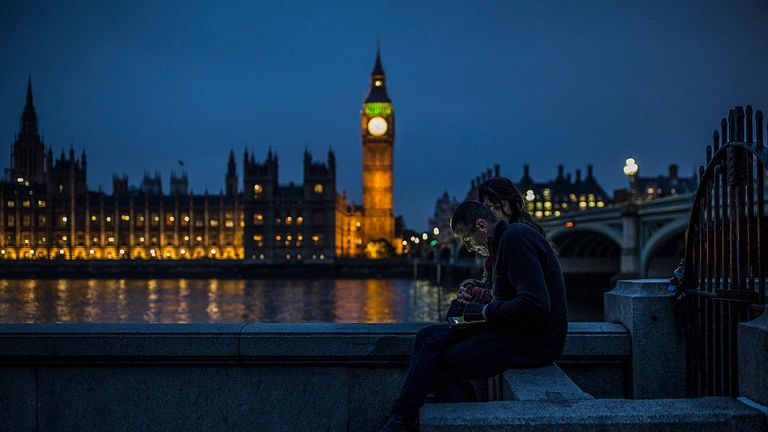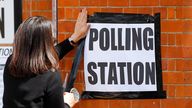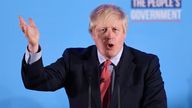Key election safeguards won't be ready for December poll
"Hostile states, foreign lobbyists, and shadowy third parties" could jeopardise the integrity of a December general election.
Sunday 3 November 2019 13:43, UK
Six months after announcing a range of new measures to "safeguard elections" and "crack down on intimidation, influence and disinformation", the government has failed to introduce any protections.
"Hostile states, foreign lobbyists, and shadowy third parties" could jeopardise the integrity of any election or referendum in the UK, according to the government statement when these safeguards were announced.
But a cabinet office spokesperson confirmed to Sky News that despite this risk, the safeguards will not be in place for the general election in December.
At the time the safeguards were announced the government said it would introduce new laws making it an offence to intimidate candidates or campaigners during the period before an election, both in person and online.
It was also set to clarify the offence of "undue influence of a voter" which has proved difficult for enforcement agencies to interpret, and it would have extended real-world laws about election material to material published online.
Currently, any candidate, political party or non-party campaigner is required to have an imprint on any of their printed election material to show that they have produced it.
A digital imprint regime would have introduced a similar requirement for Facebook, YouTube and similar social media platforms used by campaigners.
However, none of these changes have been made law by the government, which has been criticised by MPs for failing to do enough to investigate election interference in the UK.
A parliamentary inquiry into disinformation called on the government to investigate the Russian state's alleged attempts to influence the Brexit referendum in 2016.
In a report in February, MPs criticised the government's claim that it "has not seen evidence of successful use of disinformation by foreign actors, including Russia, to influence UK democratic processes" despite acknowledging that such disinformation campaigns took place.
It specifically criticised the government saying there had been no evidence of "successful interference" because, as it said, "the term 'successful' is impossible to define in retrospect".
How to determine whether interference campaigns were successful has also been an issue in the US where a declassified intelligence community assessment found that Russia attempted to interfere in the 2016 presidential election in support of Donald Trump, but without affecting the result.
Facebook recently called on the British government to define what a "political advertisement" is as it prepared for more criticism over interference ahead of an expected UK general election.
While there are strict laws in the UK for broadcasters about news reports and political advertising during election campaigns, the same laws don't apply to social media platforms.
This gap has caused concern because the sheer number of users on social media platforms and the targeted way that advertisers can send them tailored messages could allow those ads to have more impact.
A spokesman for the Cabinet Office said: "There is no evidence that UK democratic processes have been compromised by interference, but we are not complacent.
"This government has worked tirelessly to protect our democracy and it is important to remember that our electoral system is already robust as we head into this election".





